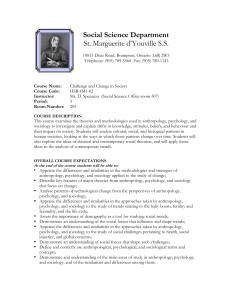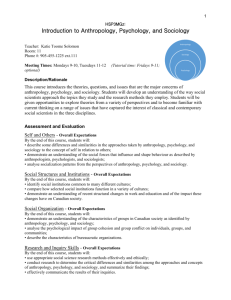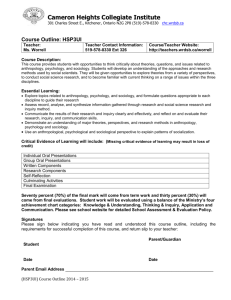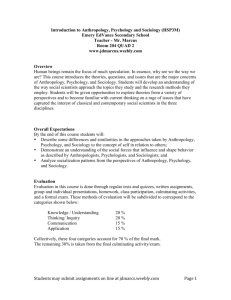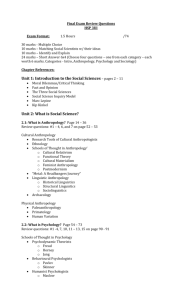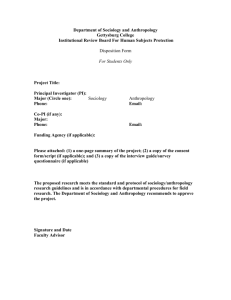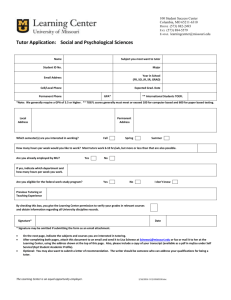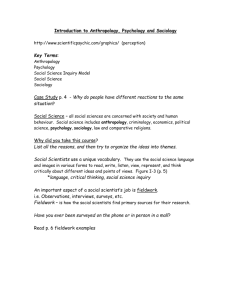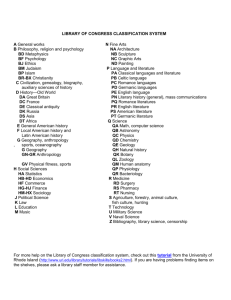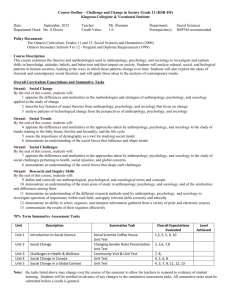HSP 3M
advertisement
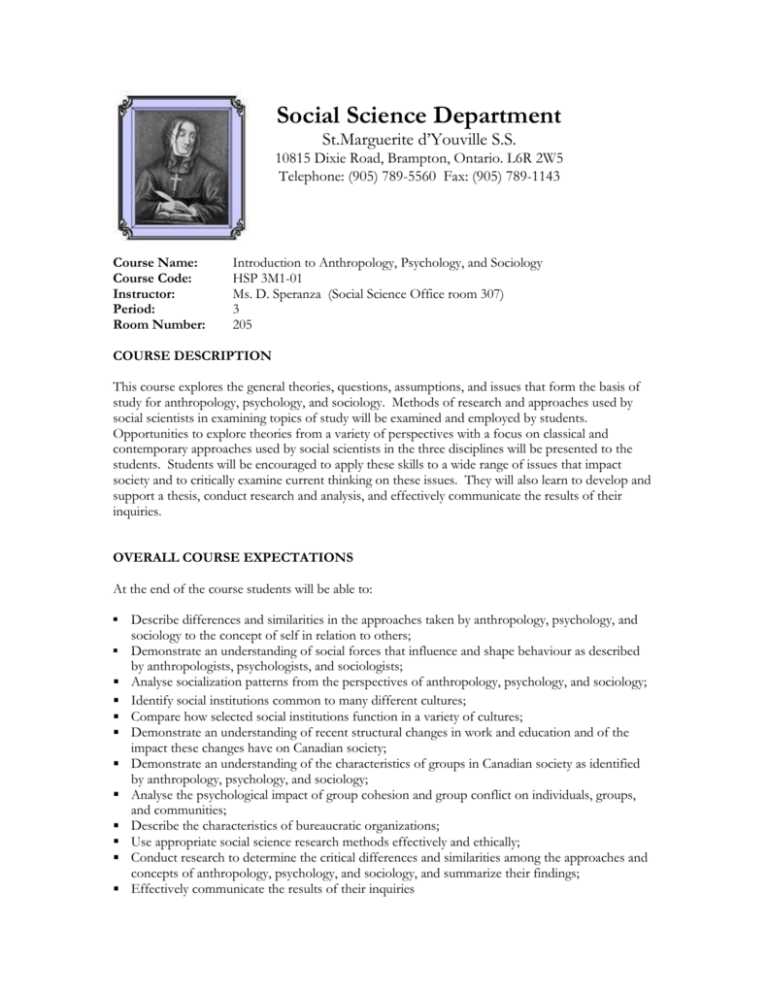
Social Science Department St.Marguerite d’Youville S.S. 10815 Dixie Road, Brampton, Ontario. L6R 2W5 Telephone: (905) 789-5560 Fax: (905) 789-1143 Course Name: Course Code: Instructor: Period: Room Number: Introduction to Anthropology, Psychology, and Sociology HSP 3M1-01 Ms. D. Speranza (Social Science Office room 307) 3 205 COURSE DESCRIPTION This course explores the general theories, questions, assumptions, and issues that form the basis of study for anthropology, psychology, and sociology. Methods of research and approaches used by social scientists in examining topics of study will be examined and employed by students. Opportunities to explore theories from a variety of perspectives with a focus on classical and contemporary approaches used by social scientists in the three disciplines will be presented to the students. Students will be encouraged to apply these skills to a wide range of issues that impact society and to critically examine current thinking on these issues. They will also learn to develop and support a thesis, conduct research and analysis, and effectively communicate the results of their inquiries. OVERALL COURSE EXPECTATIONS At the end of the course students will be able to: ▪ Describe differences and similarities in the approaches taken by anthropology, psychology, and sociology to the concept of self in relation to others; ▪ Demonstrate an understanding of social forces that influence and shape behaviour as described by anthropologists, psychologists, and sociologists; Analyse socialization patterns from the perspectives of anthropology, psychology, and sociology; Identify social institutions common to many different cultures; Compare how selected social institutions function in a variety of cultures; Demonstrate an understanding of recent structural changes in work and education and of the impact these changes have on Canadian society; Demonstrate an understanding of the characteristics of groups in Canadian society as identified by anthropology, psychology, and sociology; Analyse the psychological impact of group cohesion and group conflict on individuals, groups, and communities; Describe the characteristics of bureaucratic organizations; Use appropriate social science research methods effectively and ethically; Conduct research to determine the critical differences and similarities among the approaches and concepts of anthropology, psychology, and sociology, and summarize their findings; Effectively communicate the results of their inquiries COURSE CONTENT This course will be organized according to the following themes: Unit 1 Introduction to Social Sciences Unit 2 Self and Others Unit 3 Social Organization Unit 4 Social Structures and Institutions * With Research and Inquiry Skills built into units 1-4 EVALAUTION POLICY Students will be assessed and evaluated according to the work they have produced and skills they have displayed. Methods of providing feedback will include assessing completed assignments, tests, co-operative learning activities, simulations and presentations. Student marks will be determined by assessing and evaluating process and product according to the Achievement Level Chart given below. Grade Range Achievement Level Achievement Level Description 80–100% Level 4 A very high to outstanding level of achievement. Achievement is above the provincial standard. 70–79% Level 3 A high level of achievement. Achievement is at the provincial standard. 60–69% Level 2 A moderate level of achievement. Achievement is below, but approaching, the provincial standard. 50–59% Level 1 A passable level of achievement. Achievement is below the provincial standard. Below 50% Insufficient achievement of curriculum expectations. A credit will not be granted. EVALUATION STRUCTURE Student work will be assessed and evaluated according to the four achievement categories defined in the curriculum document (Ontario Curriculum, Canadian and World Studies, 2005). Category and Description Knowledge and Understanding: Weight 25 Includes content acquired throughout the course and comprehension of its meaning and significance. 25 Thinking: Deals with the use of critical and creative thinking skills and or processes. 25 Communication: Is conveying meaning through various forms. 25 Application: Includes the use of knowledge and skills to make connections within and between various contexts. FINAL GRADES The four assessment and evaluation categories are reflected in day-to-day activities, quizzes, unit tests, culminating activities, independent study units (ISU), and on the final examination. The final grade in this course will be based on: Introduction to Anthropology, Psychology, and Sociology Grade Distribution Term Work 70% Course Culminating Activity 10% Examination 20% RESOURCES Bain, C.M. and Colyer, J.S., The Human Way: Introducing Anthropology, Psychology, and Sociology. Toronto: Oxford University Press, 2001. Hawkes, Charles et. al Images of Society: Introduction to Anthropology, Psychology, and Sociology. Toronto: McGraw-Hill Ryerson Limited., 2001 Knapp, Mark. L., Interpersonal Communication and Human Relationships. Boston: Allyn and Bacon, Inc., 1984. Marshall, Victor W., Aging in Canada: Social Perspectives 2nd edition. Toronto: Fitzhenry and Whiteside, 1987. Santrock, John W., Adolescence An Introduction 5th edition. Madison: Brown and Benchmark Publishers, 1993. Sproule, Wayne, People in Perspective. Toronto: Prentice-Hall Canada Inc., 1994. Zeitlin, Irving M. Ideology and the Development of Sociological Theory. New Jersey: Prentice-Hall, Inc., 1987. Other Print Media and Internet Resources REPLACEMENT COST The replacement cost for a lost, stolen, or damaged textbook, which is beyond repair, is $85.00. The student will pay the cost of repairing and/or replacing a textbook. OTHER EVALUATION ISSUES Late Submissions: Daily assignments and performance tasks submitted late are subject to a penalty of 10% per day to a maximum of 1 day. Culminating activities and assignments will be subject to a penalty of 10% per day to a maximum of 1 day or the last day of class which ever comes first. Tests and Quizzes: There will be a minimum of 4 tests. Students will be quizzed at anytime on daily material covered in class. A note must accompany all missed tests and students must be prepared to write on the day of their return. A quiz will only be administered once during class time. Final Examination: At the end of the course students will write a final exam. Failure to write the exam will result in an examination grade of ZERO. Plagiarism: There is no tolerance for plagiarism. All sources must be documented using MLA format. Plagiarism will result in a mark of ZERO on assignments. Please refer to the Student Agenda Handbook (2008/2009) for school policies on late assignments, incomplete assignments, missed tests and examinations, plagiarism, absences, school suspensions and other related issues.
